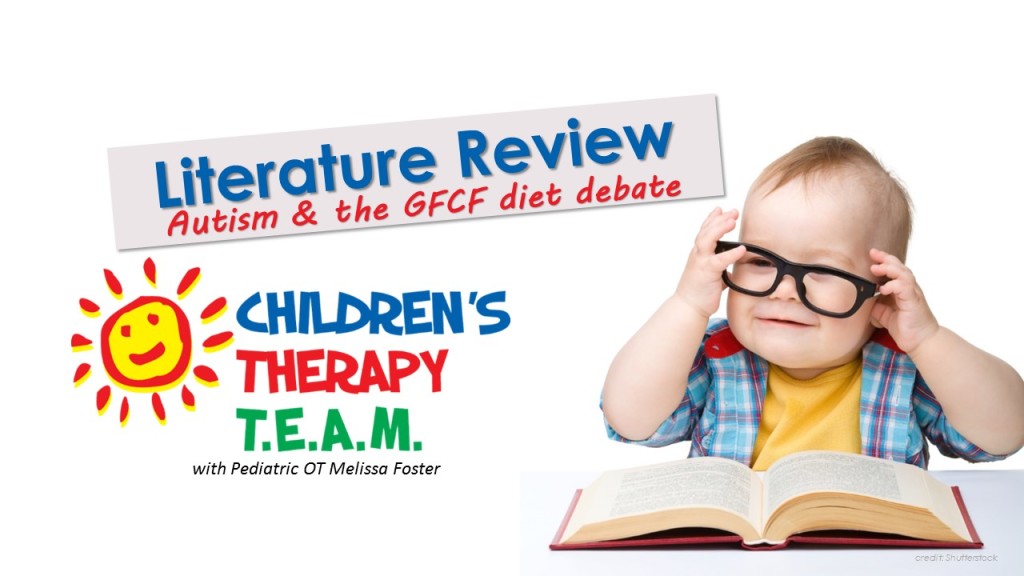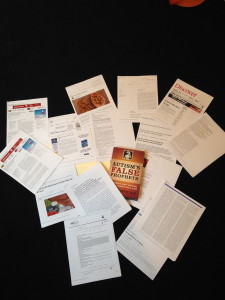
Dear Melissa,
My 3 year old son was just diagnosed with Autism. In researching this diagnosis, I am finding numerous on-line parent groups discussing the benefits of a Gluten-Free/Casein-Free diet. Should I consider changing my son’s diet?
This is a pretty hot button topic. Knowing this, I completed hours of research and reviewed piles of literature on the topic. So, let’s begin by defining these odd sounding dietary items, gluten and casein. Gluten is a protein found in cereal grains. The gluten proteins found in wheat, barley and rye are problematic for people with celiac disease or gluten sensitivity. Casein on the other hand is a protein found in milk and cheese. In addition, many processed foods also contain wheat products, milk products, or both.
What is a Gluten-Free/Casein-Free (GFCF) Diet?
The benefit of a GFCF diet is based on the theory that children with Autism Spectrum Disorders (ASD) may have an allergy or particular sensitivity to foods containing gluten or casein. In this theory, children with Autism process peptides and proteins in foods containing gluten and casein differently than other people do. Hypothetically, removing these compounds from a child’s diet will help reduce the common symptoms of Autism, such as social withdrawal and repetitive behaviors.
Pros of a GFCF diet:
- Many parents report that their child had a decrease of Autism-related symptoms after placing him/her on a GFCF diet.
- In general, a GFCF diet is often an overall healthier diet than the diet a child typically eats. This diet tends to have reduced amounts of fast foods, processed foods, and overall “junk”.
- After much searching, I found several articles from Dr. Harumi Jyonouchi that link certain elimination diets to an improvement in gastrointestinal symptoms for children with ASD. She suggests eliminating dairy first (since it has the most commercially available substitutes) then soy, then gluten as the final elimination if necessary. (Note that she not only researches a GFCF diet, but the elimination of soy as well.) There are several links to these articles in the resource section below.
Cons of a GFCF diet:
- Children on the Autism Spectrum often have severely limited diets already. The American Academy of Pediatrics voices concerns that eliminating even more items from their diet can cause severe nutritional deficiencies, especially calcium, vitamin D, and iron. These deficiencies are of particular concern because they have been linked to sleep disturbances in children with ASD. These nutrients are also vital for bone development.
- Purchasing GFCF products can be more expensive and time consuming for parents to locate.
- Probably the most important con: The literature as a whole simply does not support a GFCF diet for children with ASD. In 2010, Pediatrics (the Journal for the American Academy of Pediatrics) published a consensus report: “The Evaluation, Diagnosis, and Treatment of Gastrointestinal Disorders in Individuals with ASD.” This report stated:
- Available research does not support the use of a casein-free diet, a gluten-free diet, or a combined gluten-free/casein-free (GFCF) diet as a primary treatment for individuals with ASDs.
- Many dietary modifications are believed to have a beneficial outcome, although placebo effects are likely to be high in this setting.
- It should be noted that the 15th author of the 27 authors on this paper was Dr. Harumi Jyonouchi mentioned above.
My Personal Opinion:
The literature does not currently support the use of a GFCF diet. And, in over a decade of practice working with dozens of children who have been on a GFCF diet, I have never observed a noticeable improvement that coincided with introducing a GFCF diet OR returning from a GFCF diet back to a non-restricted diet.
That said, if I had a child with moderate to severe Autism, I would probably give it a try. Why? Because, even though I am extremely science-minded and want only true peer-reviewed research studies for intervention, I do know that every child is different, and every child reacts differently to the world around him. AND, we are talking about food. Plain food. Not a non-FDA-approved supplement that my neighbor is trying to sell me. Just food. And, according to Paul A. Offit, MD, author of Autism’s False Prophets, the biggest concern with the GFCF diet is the lack of calcium and vitamin D in the child’s diet. So, as a parent, if I was able to make sure that my child was getting plenty of calcium from food (dark leafy greens, almonds, broccoli, oranges, white beans, salmon) and getting plenty of vitamin D from short sun exposures (ask your doctor), mushrooms, and supplementation, I would definitely try it.
However, and this is a very important point, I would definitely try it for a specific period of time, say 2-3 months. I would then stop the restricted diet for the same period of time, and see if there was a difference in behavior and GI distress. Even better, don’t tell your child’s teachers/therapists that you are doing these diet modifications, and see if they observe changes in your child’s behavior. This will help to eliminate the placebo effect. You might possibly see that your child is among the minority of individuals who is greatly affected by these proteins. However, it will also let you know if you are wasting your time, money, and stress levels, and need to focus your energy elsewhere.
Are you a parent of a child with ASD who has tried a GFCF diet? Did it work for you? Did it not? I would love to hear your stories! share@childrenstherapyteam.com
I have provided TONS of resources this week, so you can look at both sides of the issue. Happy researching!
Resources/Supplemental Articles
Brennan, D. (reviewer) Gluten-Free/Casein-Free Diets for Autism, (September 2015) WebMD.
Bortfeld, H., In Defense of the CGCFST Diet for Children with Autism, (Posted September 29, 2015), Talk About Curing Autism (TACA) Non-Profit Advocacy
Buie, T. The relationship of autism and gluten, (2013) Clinical Therapeutics Journal, Harvard Medical School. 35(5), 578-83.
Buie, T., Campbell, D. B., Fuchs, G. J., Gleen, T. F., . . . Winter, H. (2010) Evaluation, Diagnosis, and Treatment of Gastrointestinal Disorders in Individuals With ASDs: A Consensus Report, Pediatrics, American Academy of Pediatrics, vol. 125 no. Supplement 1 S1-S18.
How helpful is the casein-gluten-free diet? Autism Speaks Non-Profit Advocacy
Jyonouchi, H., Sun, S., and Itokazu, N., Innate immunity associated with inflammatory responses and cytokine production against common dietary proteins in patients with Autism Spectrum Disorders (2002), Neuropsychobiology, 46 (2), 76-84.
Wang, S., Gluten-free diet has no benefit for Children with Autism, Study Finds, (September 14, 2015), Wall Street Journal.

